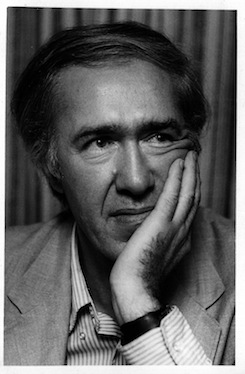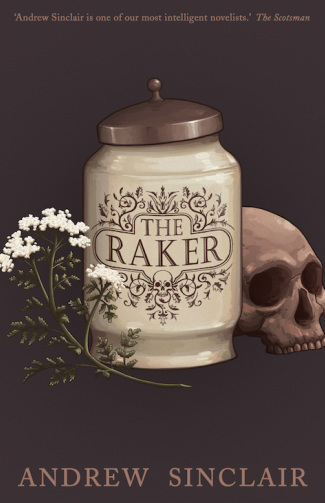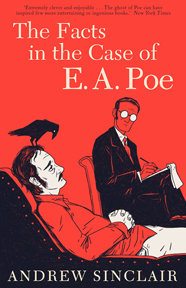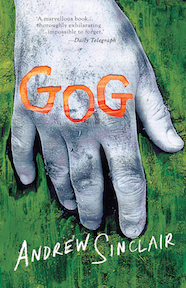|
BOOK DETAILS
Trade paper ISBN-13: 978-1939140753 List Price: $16.99 U.S. Pages: 162 Published: 2013 |
The Raker (1964)
Andrew Sinclair With a new introduction by Rob Spence Book Description
Adam Quince's business is death. A writer of obituaries, his own life of tedium is measured out by the index cards of the dead and dying which he monitors in his basement office 'morgue'. But Quince finds his passion for life reignited when he meets the beautiful actress Nada Templeton and becomes engaged in a tug-of-war with her protector, the enigmatic and sinister John Purefoy. Obsessed with death, Purefoy is 'The Raker', named after the men charged cleaning the streets during the Plague of 1665. In the novel's chilling and unforgettable climax, the duel between Quince and the Raker will culminate in a confrontation which only one of them will survive. Darkly humorous and delightfully macabre, The Raker (1964) is, as Rob Spence writes in his introduction, 'a phantasmagoric, gothic vision of a city of death, inhabited not just by those caught up in the drudgery of modern urban life, but by the ghosts of their predecessors.' This new edition of Andrew Sinclair's engaging and disturbing novel, the first in decades, coincides with the 50th anniversary of its original publication. Sinclair's The Facts in the Case of E. A. Poe (1979) is also available from Valancourt. |
reviews
'Andrew Sinclair is one of our most intelligent novelists.' - Scotsman
'Mr Sinclair is pure entertainment with his natty little tale about a hero who writes obituaries and an esoteric character who specialises in death.' - The Spectator
'Placid and macabre, this death-drenched fantasy uses satiric allegory to the hilt whilst bulls-eyeing the Establishment of contemporary London.' - Baltimore Sun
'[T]here are some remarkable scenes ... it is impossible not to be impressed by the sheer size of the task Mr Sinclair has taken on.' - The Guardian
'Mr Sinclair is pure entertainment with his natty little tale about a hero who writes obituaries and an esoteric character who specialises in death.' - The Spectator
'Placid and macabre, this death-drenched fantasy uses satiric allegory to the hilt whilst bulls-eyeing the Establishment of contemporary London.' - Baltimore Sun
'[T]here are some remarkable scenes ... it is impossible not to be impressed by the sheer size of the task Mr Sinclair has taken on.' - The Guardian
ALSO AVAILABLE THROUGH ONLINE RETAILERS
MORE TITLES BY THIS AUTHOR
AUTHOR BIOGRAPHY

Andrew Sinclair was born in Oxford in 1935 and was educated at Eton and Trinity College, Cambridge. After earning a Ph.D. in American History from Cambridge, he pursued an academic career in the United States and England. His first two novels, written while he was still at Cambridge, were both published in 1959: The Breaking of Bumbo (based on his own experience in the Coldstream Guards, and later adapted for a 1970 film written and directed by Sinclair) and My Friend Judas. Other early novels included The Project (1960), The Hallelujah Bum (1963), and The Raker (1964). The latter, also available from Valancourt, is a clever mix of Gothic fantasy and macabre comedy and was inspired by Sinclair’s relationship with Derek Lindsay, the pseudonymous author of the acclaimed novel The Rack (1958). Sinclair’s best-known novel, Gog (1967), a highly imaginative, picaresque account of the adventures of a seven-foot-tall man who washes ashore on the Scottish coast, naked and suffering from amnesia, has been named one of the top 100 modern fantasy novels. As the first in the ‘Albion Triptych’, it was followed by Magog (1972) and King Ludd (1988).
Sinclair’s varied and prolific career has also included work in film and a large output of nonfiction. As a director, he is best known for Under Milk Wood (1972), adapted from a Dylan Thomas play and starring Richard Burton and Elizabeth Taylor. Sinclair’s nonfiction includes works on American history (including The Better Half: The Emancipation of the American Woman, which won the 1967 Somerset Maugham Award), books on Dylan Thomas, Jack London, Che Guevara, and Francis Bacon, and, more recently, works on the Knights Templar and the Freemasons.
Sinclair was elected a Fellow of the Royal Society of Literature in 1972. He lives in London.
Sinclair’s varied and prolific career has also included work in film and a large output of nonfiction. As a director, he is best known for Under Milk Wood (1972), adapted from a Dylan Thomas play and starring Richard Burton and Elizabeth Taylor. Sinclair’s nonfiction includes works on American history (including The Better Half: The Emancipation of the American Woman, which won the 1967 Somerset Maugham Award), books on Dylan Thomas, Jack London, Che Guevara, and Francis Bacon, and, more recently, works on the Knights Templar and the Freemasons.
Sinclair was elected a Fellow of the Royal Society of Literature in 1972. He lives in London.



